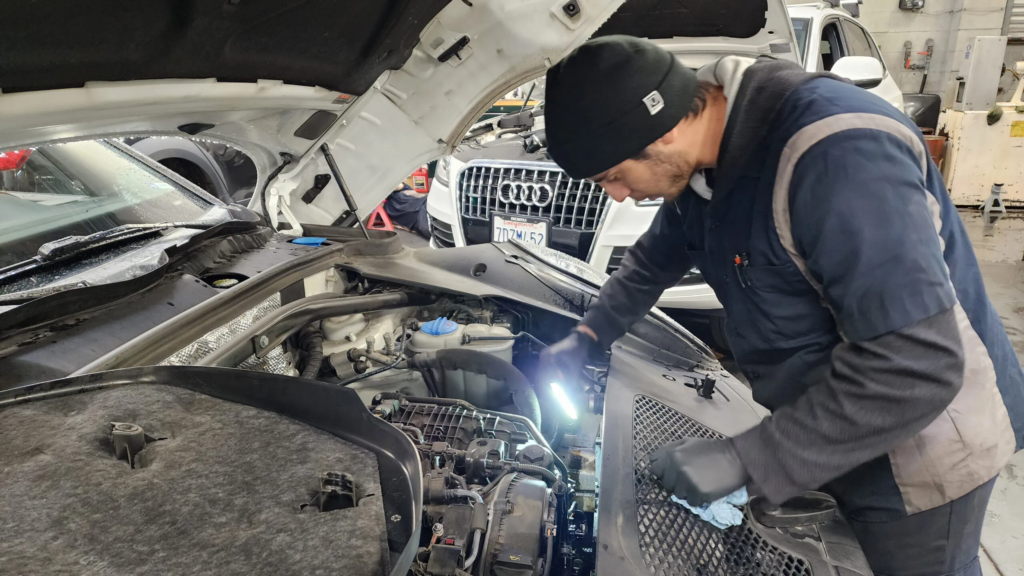
Fluids are the lifeblood of your vehicle, playing crucial roles in lubricating, cooling, and operating various systems. Regular fluid checks and maintenance are essential to ensure your car runs smoothly, efficiently, and reliably. By understanding the importance of each fluid type and the signs of potential problems, you can proactively maintain your vehicle’s health and prevent costly repairs down the road.

Engine Oil:
Engine oil lubricates moving parts within the engine, reducing friction and preventing premature wear. Over time, engine oil breaks down and becomes contaminated with dirt and debris, compromising its effectiveness. Regular oil changes, typically every 3,000 to 5,000 miles or as recommended by your vehicle manufacturer, are essential to maintain engine performance and longevity. Check oil levels regularly using the dipstick and top up as needed with the recommended grade of oil.
Coolant (Antifreeze):
Coolant circulates through the engine and radiator, regulating engine temperature and preventing overheating or freezing. Check coolant levels when the engine is cold and ensure the reservoir is filled to the appropriate level. Inspect hoses and connections for leaks or cracks that could lead to coolant loss. Replace coolant according to manufacturer recommendations to maintain proper pH balance and corrosion protection.
Transmission Fluid:
Transmission fluid lubricates gears, valves, and clutches within the transmission, ensuring smooth gear shifts and preventing excessive wear. Check transmission fluid levels and condition regularly using the dipstick or fill plug. Low fluid levels or discolored fluid (dark or burnt smell) may indicate leaks or internal transmission problems. Follow manufacturer guidelines for fluid changes and use the recommended type of transmission fluid.
Brake Fluid:

Brake fluid transfers force from the brake pedal to the brake components, ensuring effective braking performance. Check brake fluid levels in the master cylinder reservoir and inspect for signs of contamination or moisture. Brake fluid absorbs moisture over time, which can lead to decreased braking efficiency and corrosion within the braking system. Replace brake fluid according to manufacturer recommendations to maintain optimal braking performance.
Power Steering Fluid:
Power steering fluid helps facilitate smooth steering and maneuverability by reducing friction and heat within the power steering system. Check power steering fluid levels and condition regularly, and top up as needed with the recommended fluid type. Low fluid levels or foamy fluid may indicate leaks or air in the system, affecting steering responsiveness. Address any leaks promptly and replace fluid as recommended by your vehicle manufacturer.
Windshield Washer Fluid:
Windshield washer fluid helps keep your windshield clean for optimal visibility while driving. Check washer fluid levels regularly and top up with a suitable fluid that won’t freeze in cold temperatures. Ensure the washer nozzles are clear of debris to maintain effective windshield cleaning.
The Importance of Regular Checks:
Regular fluid checks are essential for several reasons:
- Preventative Maintenance: Regular fluid inspections and replacements prevent premature wear and component failure, extending the lifespan of your vehicle.
- Optimal Performance: Properly maintained fluids ensure your vehicle operates efficiently and performs at its best, whether it’s fuel efficiency, engine performance, or braking responsiveness.
- Safety: Many fluid systems, such as brakes and steering, directly impact vehicle safety. Maintaining proper fluid levels and condition ensures reliable braking, steering, and overall vehicle control.
Conclusion:
In conclusion, regular fluid checks and maintenance are crucial aspects of car ownership and maintenance. By monitoring fluid levels, condition, and following manufacturer guidelines for replacements, you can extend the life of your vehicle, maintain optimal performance, and ensure your safety on the road. If you’re unsure about performing fluid checks or maintenance tasks yourself, consult a professional mechanic or service center to ensure your vehicle’s fluids are properly inspected and serviced. Taking proactive steps to care for your car’s fluids will ultimately save you time, money, and prevent potential breakdowns or accidents related to fluid-related issues.






